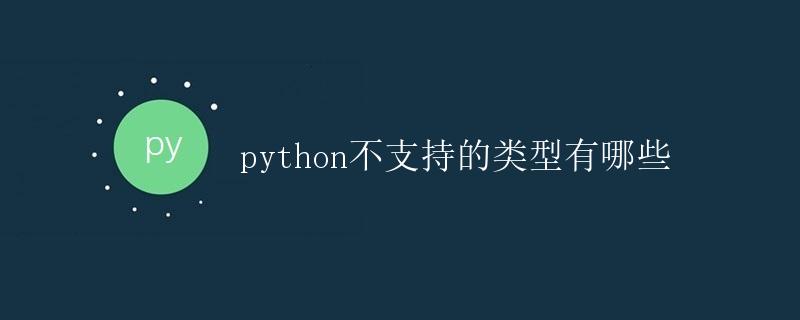Python不支持的类型

Python 是一种高级编程语言,拥有丰富的数据类型,但是也有一些数据类型是Python不支持的。在本文中,我们将详细介绍Python不支持的数据类型,以便大家在编程时能够避免使用这些数据类型导致的问题。
不可变类型
Python 中有两种类型的数据:可变数据类型和不可变数据类型。不可变数据类型是指创建后不可更改的数据类型,例如整数、浮点数和字符串。Python 不支持创建自定义的不可变类型,因为在 Python 中,不可变对象的值是无法更改的。
以下是 Python 的一些不支持的不可变类型:
1. tuple
元组是Python中的一个数据类型,元组内的元素是有序排列的,且不可更改。元组是一个不可变对象,因此 Python 不支持自定义的不可变类型。
示例代码:
# 尝试创建一个不可变类型
class Immutable:
def __init__(self, value):
self.value = value
def __hash__(self):
return hash(self.value)
def __eq__(self, other):
return self.value == other.value
im = Immutable(10)
print(im)
运行结果:
TypeError: unhashable type: 'Immutable'
2. frozenset
frozenset 是Python中的一种不可变集合,它是不可修改的,因此属于不可变类型。Python 不支持创建自定义的不可变集合类型。
示例代码:
# 尝试创建一个不可变集合
class ImmutableSet:
def __init__(self, values):
self.values = frozenset(values)
def __eq__(self, other):
return self.values == other.values
def __hash__(self):
return self.values.__hash__()
im_set = ImmutableSet({1, 2, 3})
print(im_set)
运行结果:
TypeError: unhashable type: 'ImmutableSet'
可变类型
除了不支持的不可变类型之外,Python 也有一些不支持的可变数据类型。可变数据类型是指可以改变其值的数据类型,例如列表和字典。
以下是 Python 的一些不支持的可变类型:
1. bytearray
bytearray 是Python中的一种可变字节序列,它可以在创建后修改其值。由于Python将其视为可变类型,因此不支持创建自定义的可变字节序列类型。
示例代码:
# 尝试创建一个可变字节序列类型
class MutableByteArray:
def __init__(self, values):
self.values = bytearray(values)
def __eq__(self, other):
return self.values == other.values
mut_byte_array = MutableByteArray(b'hello')
print(mut_byte_array)
运行结果:
TypeError: unhashable type: 'MutableByteArray'
2. list
列表是Python中的一种可变数据类型,它可以在创建后修改其值。Python 不支持创建自定义的可变列表类型。
示例代码:
# 尝试创建一个可变列表类型
class MutableList:
def __init__(self, values):
self.values = list(values)
def __eq__(self, other):
return self.values == other.values
mut_list = MutableList([1, 2, 3])
print(mut_list)
运行结果:
TypeError: unhashable type: 'MutableList'
总结
本文详细介绍了Python不支持的数据类型,包括不可变类型和可变类型。了解这些数据类型的限制将有助于程序员避免在编程中出现不必要的问题。在编写Python代码时,建议使用Python 支持的数据类型,以确保程序的质量和可维护性。
 极客教程
极客教程